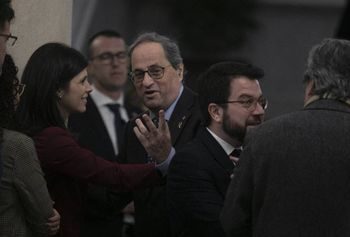

The Catalan regional government on Tuesday observed the second anniversary of the unauthorized independence referendum of October 1, 2017 with a public address that urged citizens to revive the spirit of the breakaway bid in order to advance toward a Catalan republic.
Standing inside the courtyard of the Palau de la Generalitat, the building that houses the regional executive, regional premier Quim Torra and his deputy Pere Aragonès read out a speech telling Catalan society to rekindle that spirit in order to address “the challenges of the future.”
We will advance toward the Catalan republic the only way we know how: democratically and peacefully
Catalan premier Quim Torra
Flanked by other high-ranking government officials, Torra and Aragonès pledged to “advance without any excuses toward the Catalan republic. We will do so the only way we know how: democratically and peacefully.”
Also on Tuesday, other independence leaders – representatives from parties Together for Catalunya (JxC), the Republican Catalan Left (ERC) and the far-left CUP, as well as civil societies ANC and Òmnium Cultural – read out a manifesto calling for a “massive response based on non-violent struggle and civil disobedience” to the upcoming ruling by the Supreme Court on the fate of 12 leaders who led the illegal breakaway attempt of 2017. The independence movement widely expects these leaders to be found guilty of rebellion, a crime that entails long prison terms.
Puigdemont in Brussels
EL PAÍS
Ex-Catalan premier Carles Puigdemont made a public appearance on Tuesday in Brussels, where he demanded the right to take up his seat in the European Parliament. “Two years ago now, we voted in an independence referendum in Catalonia. They tell us our votes do not count. That is intolerable. The European Parliament has started working without considering more than two million citizens who are not represented. We trust that democracy will prevail in the end,” he said, alluding to the European Union elections of May, when his Together for Catalonia party earned two seats.
But taking up the position entailed first traveling to Madrid to pick up his official credentials, a move that would have gotten him arrested to face the same charges as his colleagues who stayed behind and were tried for rebellion at the Supreme Court.
Jordi Cañas, a member of the European Parliament for Ciudadanos (Citizens), a non-separatist party born in Catalonia, said that the fact that Puigdemont is not in prison is “a problem for European democracy.”
“Two years ago, some tried to violate Spanish democracy with an illegal referendum […] without caring about the consequences. Some people are now paying the consequences, and some are not.”
Last week, Torra publicly defended nine individuals who were arrested on suspicion of preparing violent acts on or around the anniversary of the referendum. The suspects have been charged with terrorism offenses after the police seized bomb-making material and instructions on how to make explosives, according to the investigation. Torra said last week that there is an attempt “to create a phony narrative of violence in Catalonia.”
“We pledge to persist until we achieve freedom for the political prisoners and the return of exiled individuals,” said Torra, alluding to the tried secession leaders and to his own predecessor Carles Puigdemont, who fled Spain to avoid arrest and now lives in Belgium [see side box].
“The regional government asserts that the spirit of that day [October 1, 2017] and the days that followed, especially October 3 [when there were street demonstrations to protest both the police charges against referendum voters and King Felipe VI’s subsequent address to the nation], is the spirit with which we must face the challenges of the future, especially along this path to the Catalan republic, which will be inevitable and which we want to build with everyone,” said Aragonès.
Torra had words of sympathy for the citizens who were hurt during the police charges that took place that day in a bid to stop a vote that had been declared unconstitutional by Spain’s highest court. He said that “2.3 million citizens went out to vote and defended the ballot boxes. Catalan society, as a repository of civil and political rights, defended them despite the consequences, despite being beaten and assaulted by forces sent in by the Spanish state.”
An opinion poll published this May by the regional government’s Opinion Studies Center (CEO) found that 48.6% of respondents rejected secession from Spain, compared to 44.1% in March.
A return of direct rule?
Carlos E. Cué, Madrid
Spain’s caretaker prime minister, Pedro Sánchez, made clear on Tuesday that the central government could once again suspend Catalonia’s regional powers under Article 155 of the Constitution, and that his administration has been studying the possibility of doing so.
The previous Popular Party government led by then-Prime Minister Mariano Rajoy used Article 155 in the wake of the 2017 independence drive in the northeastern Spanish region, which saw an outlawed referendum on secession take place on October 1 of that year, and a subsequent unilateral declaration of independence passed through the Catalan regional government on October 27.
Speaking to the Cadena SER radio network on Tuesday morning, Sánchez, of the Socialist Party (PSOE), said that there was no issue with the application of Article 155, despite the fact that parliament has been dissolved ahead of a fresh general election on November 10. “A caretaker government has greatly diminished powers, but [Article] 155 can be applied without problems, we have studied this and there would be no problems in terms of the Constitution or its legitimacy […],” he said.
Sánchez added that the central government is prepared to appeal any decisions taken by the Catalan regional government that it considers to be unconstitutional, as it has done up to now. He also called on separatist leaders in Catalonia “not to play with fire.”
The caretaker prime minister’s interview with Cadena SER took place not only on the second anniversary of the illegal independence referendum, but also just days before the Supreme Court is due to release its ruling in the trial of the pro-independence leaders accused of committing offenses during the 2017 secessionist drive.
English version by Susana Urra and Simon Hunter.
Get real time update about this post categories directly on your device, subscribe now.





















